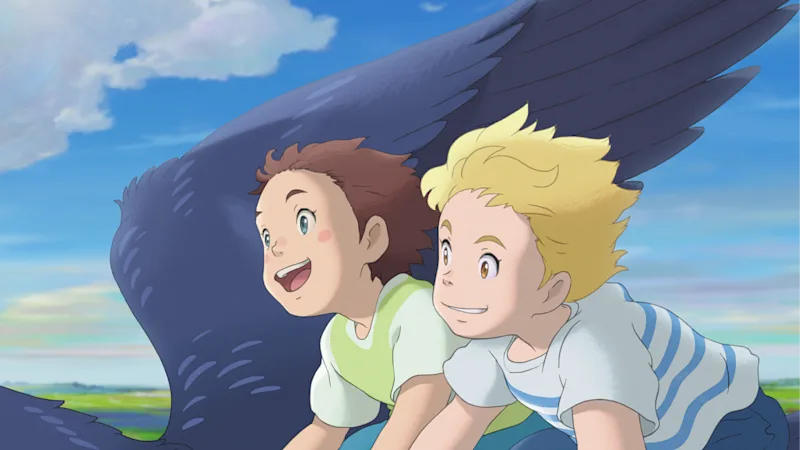Oscar-winning filmmaker Brenda Chapman remembers getting the call in 1994 from former Disney head Jeffery Katzenberg, inviting her to join his newly formed DreamWorks Animation Studio for an ambitious mystery project. At the time, she was hard at work on storyboards for Disney's then-upcoming adaptation of The Hunchback of Notre Dame.
Katzenberg, who had overseen Chapman's Disney tenure on films like The Little Mermaid, Beauty and the Beast and The Lion King before forming DreamWorks with filmmaker Steven Spielberg and music mogul David Geffen, was initially coy about the project. But he was offering her a chance to head the story department, a considerable milestone. Still, she needed to know a lot more about the project. Then, Katzenberg caved and told her.
"Are you crazy?" she recalls asking him. "It has God in it!"
The project was an adaptation of the story of Moses. The vision would be bold, the scope epic. It was a daunting prospect for a number of reasons, and it wasn't until Spielberg himself called Chapman to personally convince her to take it on that she agreed to join what would in time be considered one of the most impactful American animated features ever made: The Prince of Egypt.
The film took four years to bring to the screen, with more than 425 animators, artists and technicians working under Chapman and co-directors Steve Hickner and Simon Wells. The Prince of Egypt broke ground by adopting a more adult tone, with the intention of expanding the narrative, thematic, and aesthetic boundaries of popular animation. In the 25 years since its release in 1998, the film has stood as a trailblazing achievement.
The Prince of Egypt received two Oscar nominations, one for Best Original Musical Score by Stephen Schwartz and Hans Zimmer, and another for Best Original Song for the iconic ballad "When You Believe," written and composed by Schwartz, and performed by Mariah Carey and Whitney Houston. The uplifting song, which marked Carey and Houston's only musical collaboration with one another, ultimately won the Oscar.
As The Prince of Egypt approaches its silver anniversary, A.frame spoke with the film's directors to reflect on the making of this cinematic milestone, its new 4K UHD restoration, and its enduring legacy. "I actually feel that the film has aged better when you look at it now," says Hickner.

The Prince of Egypt went into production during the last few years of animation's hand-drawn glory years, before computer-generated work became the industry status quo. While some digital technology is featured throughout the film — such as in the spectacular parting of the Red Sea sequence — the characters were fully rendered by hand. It was also one of the last animated features to use hand-painted backgrounds.
Like Chapman, Hickner had previously worked at Disney. When he and Wells received the invite to join DreamWorks, however, they had both been working at Spielberg's Amblimation in the U.K., or what Wells refers to as the "Spielberg School of Filmmaking." Hickner was developing an animated adaptation of Andrew Lloyd Webber's Cats, while Wells had co-directed We're Back! A Dinosaur Story (1993) and was the sole director of Balto (1995).
Wells recalls Katzenberg's rather intimidating directive for The Prince of Egypt: The film should look as if it were drawn by French illustrator Gustave Doré, painted by famed impressionist Claude Monet, and directed by David Lean — a filmmaker who definitely knew a thing or two about scope.
"Ok, we'll just do that then!" Wells quips. "I have to give Jeffrey credit; he gave us the space to make the movie. There was this tremendous attitude that this was going to be a place for artists to really explore."
"The directive from Jeffrey was that he didn’t want to do Disney," Hickner adds. "So, the idea was to carve our own edge."
The three filmmakers worked closely together on every aspect of the film's production, including the consulting of religious leaders from across the globe to ensure that the film’s source material was approached with the utmost care and respect. But what became clear very quickly was that this was a story with universal themes relatable to people of all backgrounds and faiths.
For Chapman, the film's narrative, well-worn on the big screen but still teeming with potential for modern audiences, came into focus after seeing a beautiful sketch by story artist Ronnie del Carmen. It was a depiction of the character of Ramesses sitting in the lap of his father's statue, an image that effortlessly seemed to convey the weight and pressure of the crown he was set to inherit. Meanwhile, his brother Moses is portrayed casually relaxing below with a water balloon. Simply put, their film would be about the relationship between two brothers whose destinies were on a collision course.
"I think that's one of the things that is actually very powerful about the film," Wells says. "It's not just about religion. This is actually about somebody having to come to terms with an identity that he hadn't grown up with, struggling about whether he is going to accept it or not."

One of the lasting legacies of The Prince of Egypt is its voice cast, led by two powerhouse performances from Val Kilmer as Moses and Ralph Fiennes as Ramesses. "Val blew us away," Chapman says. "His voice quality was so beautiful, and he just really connected. It was incredible what they all brought to it."
The film features an equally impressive supporting cast, including Sandra Bullock, Michelle Pfeiffer, Jeff Goldblum, Danny Glover, Martin Short, Steve Martin, Helen Mirren, and Sir Patrick Stewart. Wells remembers during the recording process, he had the chance to read lines opposite Stewart, who played Pharaoh Seti. "Being in the firing line and the narrow focus of an actor like him, it was a real rush," he says.
As with any film, The Prince of Egypt came with its many challenges. Featuring depictions of slavery, a hieroglyphic nightmare sequence, and plagues of death, it strayed notably from the space Disney had carved for popular animation. There was no room for cute sidekicks and family-friendly humor of any kind, which raised some eyebrows upon the film's release.
"We wanted to create a studio that stood on its own, not copy what Disney did," Chapman says. "That's why Jeffrey and Steven chose such an intense first story."
Chapman, meanwhile, became the first woman to ever direct an American animated feature film. "I never looked at my position as being a milestone," she says. "I was just doing what I loved to do, but I became aware of it as a moment in time for women."
To hear Wells tell it, "Jeffrey was very keen to promote her and make Brenda the first woman to direct a Hollywood produced animated feature." She had previously served as lead story supervisor on The Lion King, and Wells calls her the "heart and soul" of that movie. Chapman would go on to win the Oscar for Best Animated Feature in 2012 for co-directing Disney and Pixar's Brave with Mark Andrews.

As The Prince of Egypt approaches its 25th anniversary, Chapman, Hickner and Wells are delighted to know that the film is being celebrated with a new 4K restoration from Universal Studios and DreamWorks Animation. "It means they considers it a crown jewel," Hickner says with a smile.
The new 4K UHD Blu-ray release offers an unprecedented presentation of the film's breathtaking animation, showcasing its hand-drawn human artistry like never before. The release also features a new DTS:X audio track, offering a reference-quality presentation for home theater-viewing and a proper experience for its acclaimed musical elements.
"I'm really proud of the film and what we accomplished on it," Chapman says. "I'm thrilled that it's had the legs that it has had and feel that it opened a door — I don't know if it opened wide enough to really look into different types of storytelling for animation, but it touched a certain group of people."
For Wells part, he says, "As the years have gone on, meeting people who say, 'This movie had a big effect on me,' means it had more of a cultural impact than we realized at the time."
The film's themes of faith, resilience and hope continue to resonate years later. Hickner recalls meeting a fan at a screening not long ago who shared with him that The Prince of Egypt had changed her life. "How can a movie change your life?" he asked the young woman, who explained to him that she had grown up in a troubled household. "Immediately after seeing the film as a child, her mom said to her, 'We're never going home again,' and they never did," he recalls of the emotional exchange. "She said that their lives got better from that point on. As an audience reaction, you can't get better than that!"
The Prince of Egypt: 25th Anniversary Edition is now available on 4K Ultra HD Blu-Ray.

By Adam J. Yeend
RELATED CONTENT:
Inside 'Casablanca's 80th Anniversary Restoration: 'The Difference Is Nothing Short of Miraculous' (Exclusive)
After 40 Years, Director Robert Wise's 'Star Trek: The Motion Picture' Is Finally Complete (Exclusive)
'Dear Basketball': How Kobe Bryant Cemented His Basketball Legacy in Animation (Exclusive)







